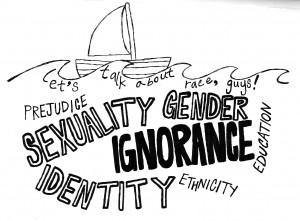Focus on ignorance, not just racism
It’s not uncommon in 2013 to hear a media outlet of some sort calling on Americans for a “frank and honest discussion about race.”
Quite honestly, a large proportion of articles I’ve read that document racial and cultural tensions seem to conclude with an anecdote about how Americans need to talk about race in order to make it less of an divisive issue.
And the general volume of material about race generated online and over the airwaves is tremendous. In that sense, it seems quite plain that this “conversation” is already happening, and happening a lot. It doesn’t hurt that articles corroborating claims of racism in America tend to court controversy and attention, as they strike a nerve about a problem that many would prefer to ignore.
Indeed, despite its publication more than two weeks ago, Robert Huber’s article “Being White in Philly,” published in Philadelphia Magazine, is currently in the online top-five list of The Philly Mag Network and continues to be the center of great discussion about the article’s merits.
Ta-Nehisi Coates makes the case, in a recent piece for The Atlantic, that people who call for a discussion about race often do so with the thought that the “issues that they are tackling have, somehow, never been tackled before, or if so, have not been tackled ‘honestly’ or ‘forthrightly’ or ‘candidly.’”
“In the arena of race, the notion that Americans ‘don’t talk about race’ is a particularly pernicious rendition of this logic,” Coates wrote.
In light of that, Coates is calling for more depth, not just more talk. He notes how a number of the race-issue articles he reads get “lost in a sea of interesting anecdotes that never gel into anything.” Even when they call for a discussion, these articles never amount to more than a simple description of a reality, as opposed to addressing the root causes.
Clearly, this isn’t working as well as it should. The amount of news dedicated to documenting racist acts indicates that racism is prevalent in contemporary society. But, clamoring for more discussion on race for the sake of it is misguided because the most obvious point discussed — differences in race — is not the root issue at hand.
By contrast, having a “discussion” about race often glosses over a greater issue, one that involves not only racial interaction, but also gender relations and sexual identity.
The United States needs to talk about not just race or sexuality or gender but about national ignorance. Discourse on ignorance would do more to solve the common issues of intolerance that the nation faces than trying to attack on issue on the surface.
Although a “dialogue about ignorance” could easily be dismissed as a topic just as broad and faulted as one on race, I think that writing on and conducting forums about just race is limiting largely in part because the root cause of racism — ignorance — is a thoroughly widespread issue that leads to more types of intolerance than simply ones that relate to race.
In many cases, individuals act intolerantly when they know they’re wrong but are unable, or refuse, to accept that. This refusal can result in anger that is taken out on the perceived problem, which, for many racist individuals, comprises the people who are different. In this case, the focus upon the perceived problem — that person’s racism — overlooks that person’s general mindset of willful ignorance.
I don’t think there is any question that the United States has reserved a special niche for producing some of the most ignorant people on planet Earth. Ignorance, for one, contributes to a general social air that “it’s cool to be dumb.” The apathy toward education and intellectualism in many parts of American society do nothing to advance greater tolerance toward people of different races, genders, etc.
Though dialogues on race are needed to keep the topic fresh in our collective mind, I believe that pure and unadulterated ignorance is very often overlooked in light of “solving racism.”
I could be interpreted as simply deferring a conversation on race into one on ignorance. Nevertheless, I don’t think that argument changes the importance of addressing canonical ignorance. Battling ignorance might be less black and white than fighting for one particular hot topic, but it’s also the foundation of why our nation remains so divided.
Matthew Tinoco is a freshman majoring in print and digital journalism.

